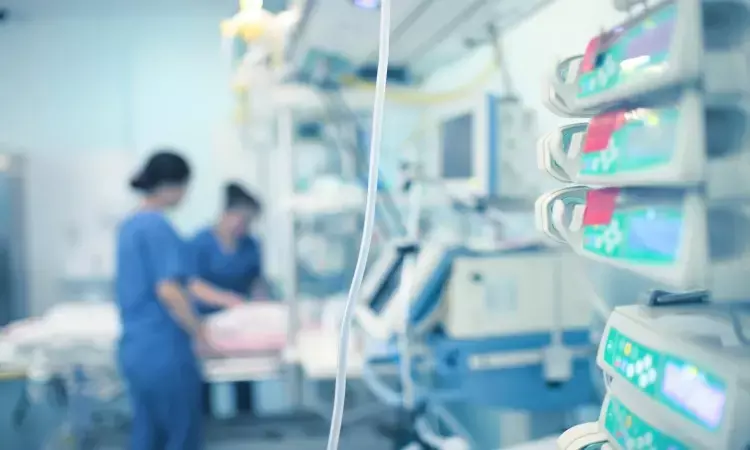- Home
- Medical news & Guidelines
- Anesthesiology
- Cardiology and CTVS
- Critical Care
- Dentistry
- Dermatology
- Diabetes and Endocrinology
- ENT
- Gastroenterology
- Medicine
- Nephrology
- Neurology
- Obstretics-Gynaecology
- Oncology
- Ophthalmology
- Orthopaedics
- Pediatrics-Neonatology
- Psychiatry
- Pulmonology
- Radiology
- Surgery
- Urology
- Laboratory Medicine
- Diet
- Nursing
- Paramedical
- Physiotherapy
- Health news
- Fact Check
- Bone Health Fact Check
- Brain Health Fact Check
- Cancer Related Fact Check
- Child Care Fact Check
- Dental and oral health fact check
- Diabetes and metabolic health fact check
- Diet and Nutrition Fact Check
- Eye and ENT Care Fact Check
- Fitness fact check
- Gut health fact check
- Heart health fact check
- Kidney health fact check
- Medical education fact check
- Men's health fact check
- Respiratory fact check
- Skin and hair care fact check
- Vaccine and Immunization fact check
- Women's health fact check
- AYUSH
- State News
- Andaman and Nicobar Islands
- Andhra Pradesh
- Arunachal Pradesh
- Assam
- Bihar
- Chandigarh
- Chattisgarh
- Dadra and Nagar Haveli
- Daman and Diu
- Delhi
- Goa
- Gujarat
- Haryana
- Himachal Pradesh
- Jammu & Kashmir
- Jharkhand
- Karnataka
- Kerala
- Ladakh
- Lakshadweep
- Madhya Pradesh
- Maharashtra
- Manipur
- Meghalaya
- Mizoram
- Nagaland
- Odisha
- Puducherry
- Punjab
- Rajasthan
- Sikkim
- Tamil Nadu
- Telangana
- Tripura
- Uttar Pradesh
- Uttrakhand
- West Bengal
- Medical Education
- Industry
Ventriculo-arterial coupling could be non-invasive prognostic parameter in ICU patients: Study

Rome, Italy: A recent study in the International Journal of Cardiology shows that ventriculo-arterial coupling (VAC) could be an additional non-invasive prognosticator of outcome in ICCU (intensive cardiac care unit) patients.
In the study, Paolo Trambaiolo, ICCU, Sandro Pertini Hospital, Rome, Italy, and the team aimed to investigate the relationship between ventriculo-arterial coupling and in-hospital outcomes and to assess the prognostic value of VAC in critically ill patients.
The researchers included a total of 329 consecutive patients (mean age 66,7 ± 15.5 years, 66.9% male) who were admitted to the intensive cardiac care unit of the Sandro Pertini Hospital, Rome (Italy) between January 2019 and December 2019.
Using the iElastance application, they underwent blood pressure measurement and non-invasive, echocardiography-derived estimates of left ventricular end-systolic elastance (Ees), arterial elastance (Ea), and VAC in a single-beat determination. In-hospital events related to acute heart failure and hypoperfusion were recorded. The need for invasive ventilation, intra-aortic balloon pump, renal replacement therapy, and death was considered as composite.
Key findings include:
- 39 patients (11,8%) experienced in-hospital complications (group C), and 290 (88,2%) did not (group NoC).
- Ea and VAC were found to be significantly higher in group C than in group NoC, and a trend toward decreased Ees was observed in group C.
- VAC was a strong and independent predictor of in-hospital clinical outcome both at univariable and multivariable analysis adjusted for comorbidities and hemodynamic parameters.
"Ventriculo-arterial coupling restoration may have a more relevant impact on prognosis than intrinsic contractility alone, expressed as ventricular elastance or ejection fraction, making uncoupling a reliable risk factor for tissue hypoperfusion," wrote the authors.
"Our findings showed that VAC might be an additional non-invasive prognosticator of outcome in critically ill patients," they concluded.
Reference:
The study titled, "Ventriculo-arterial coupling in the intensive cardiac care unit: A non-invasive prognostic parameter," was published in the International Journal of Cardiology.
Dr Kamal Kant Kohli-MBBS, DTCD- a chest specialist with more than 30 years of practice and a flair for writing clinical articles, Dr Kamal Kant Kohli joined Medical Dialogues as a Chief Editor of Medical News. Besides writing articles, as an editor, he proofreads and verifies all the medical content published on Medical Dialogues including those coming from journals, studies,medical conferences,guidelines etc. Email: drkohli@medicaldialogues.in. Contact no. 011-43720751


